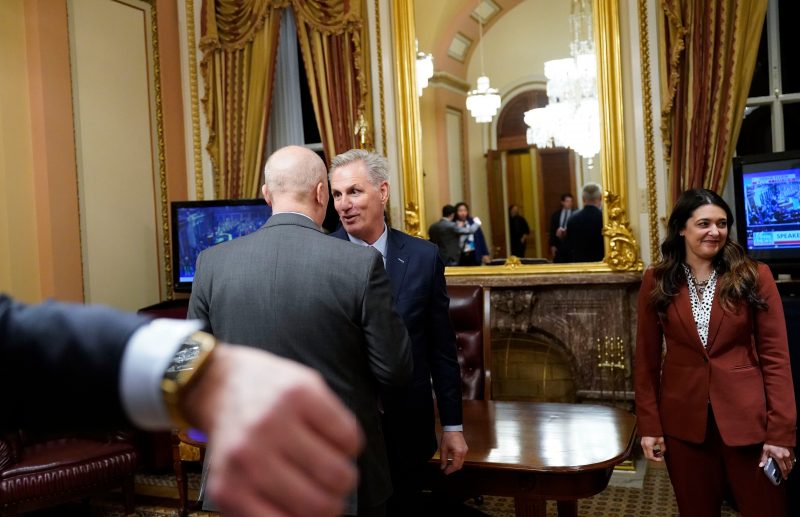We knew the House was liable to get messy when Republicans took it over and Kevin McCarthy needed to cut a mysterious agreement with the right-wing House Freedom Caucus to become speaker.
What we might not have fully appreciated at the time is how much that mess might result from not being able to agree on what the agreement was.
The first big hurdle for the debt ceiling deal McCarthy (R-Calif.) cut with President Biden over the weekend was the all-important House Rules Committee on Tuesday afternoon. This committee can make or break legislation, which is why the Freedom Caucus was keen to pry three seats from the speaker loyalists that usually inhabit it. That left McCarthy with only six such votes on a 13-member committee, shy of a majority of his allies.
But as the committee was about to take up the debt ceiling deal, one of its Freedom Caucus members lodged a remarkable claim about the January agreement: that GOP votes to advance bills on the committee effectively needed to be unanimous.
“A reminder that during Speaker negotiations to build the coalition, that it was explicit both that nothing would pass Rules Committee without AT LEAST 7 GOP votes — AND that the Committee would not allow reporting out rules without unanimous Republican votes,” Rep. Chip Roy (R-Tex.) claimed Monday on Twitter.
This is a little complicated, but Roy was basically claiming that he, fellow Freedom Caucus member Rep. Ralph Norman (R-S.C.) and a third non-McCarthy loyalist on the committee, Rep. Thomas Massie (R-Ky.), each had veto power. So even if something like the debt ceiling deal got a majority of GOP members or the committee as a whole, they would be able to stop it.
There were real reasons to doubt this. CNN’s Manu Raju reports that senior GOP aides said the agreement did require seven GOP votes to advance a bill, but not all nine.
That seven-vote threshold, in itself, would be a pretty big deal, because it would mean the committee isn’t really a majoritarian one. It looked like the bill would clear that threshold Tuesday, with Massie saying he anticipated voting yes. But a nine-vote threshold would mean it didn’t advance.
And as Roy’s claim was being chewed over, McCarthy allies acknowledged that they didn’t really know what McCarthy had given up.
“I have not heard that before,” Rep. Dusty Johnson (R-S.D.) told CNN. “If those conversations took place, the rest of the conference was unaware of them.”
Rep. Stephanie I. Bice (R-Okla.) added: “I don’t know what Speaker McCarthy agreed to, but that has not been something that any of us were familiar with.”
Another member who was apparently unfamiliar with what Roy was talking about: Massie, the most crucial vote on the Rules Committee when it came to getting to those required GOP seven. (Both Roy and Norman indicated they were opposed.)
Just to put a fine point on that: This is one of the most consequential levers of power in the House, and not only do we not have public clarity on how it works, but some Republicans admit they, too, are in the dark. Or as Bice put it, “I don’t know what Speaker McCarthy agreed to.”
That’s a remarkable state of affairs. And it traces back to a deal that was rather obviously forged with secrecy in mind — despite McCarthy’s promises of transparency.
Back when it was cut, a few brave House Republicans ventured that it might be good to know what McCarthy had given away. But their leverage was holding out on the rules package vote that came shortly after McCarthy’s election as speaker, and they passed on pressing the issue in favor of moving forward as a party after an arduous few days that included 15 ballots in the vote for speaker.
At the time, there were reports of a three-page “addendum” to the rules — a document that would seemingly outline something like this. McCarthy and others talked around whether such a deal actually existed. But Roy himself suggested that it was more of a handshake agreement.
“There’s no official list,” Roy said. “You look somebody in the eye and shake their hands and move forward. That’s precisely what happened here.”
It’s a nice idea, in theory. But then you come to a state of affairs like this, when the full faith and credit of the U.S. government is on the line, and the key players can’t agree on what the rules are.
It seems, based upon all indicators, that Roy has gotten this wrong. (His office didn’t respond to a request for comment, and he didn’t press the issue in committee Tuesday.) The fact that Massie, of all people, seemed unfamiliar with such an agreement — and that Norman hasn’t raised this as an issue — would point in that direction. The question from there is whether Roy feels misled somehow, and how that might affect his relationship with McCarthy.
Roy seemed to double down on his claims Tuesday morning, calling the deal a “betrayal of the power-sharing arrangement that we put in place.” He added that if the deal passed through the Rules Committee, “we’re going to have to then regroup and figure out the whole leadership arrangement again.”
For now, most other Freedom Caucus members aren’t talking about removing McCarthy as speaker by using a “motion to vacate the chair,” which is part of another concession they gained in January.
But it’s unlikely to be the last time McCarthy will need Roy on something big. Throw on top of that the fact that the House is basically being run with secret rules, and that’s a real recipe for some hard feelings — at the least.



























